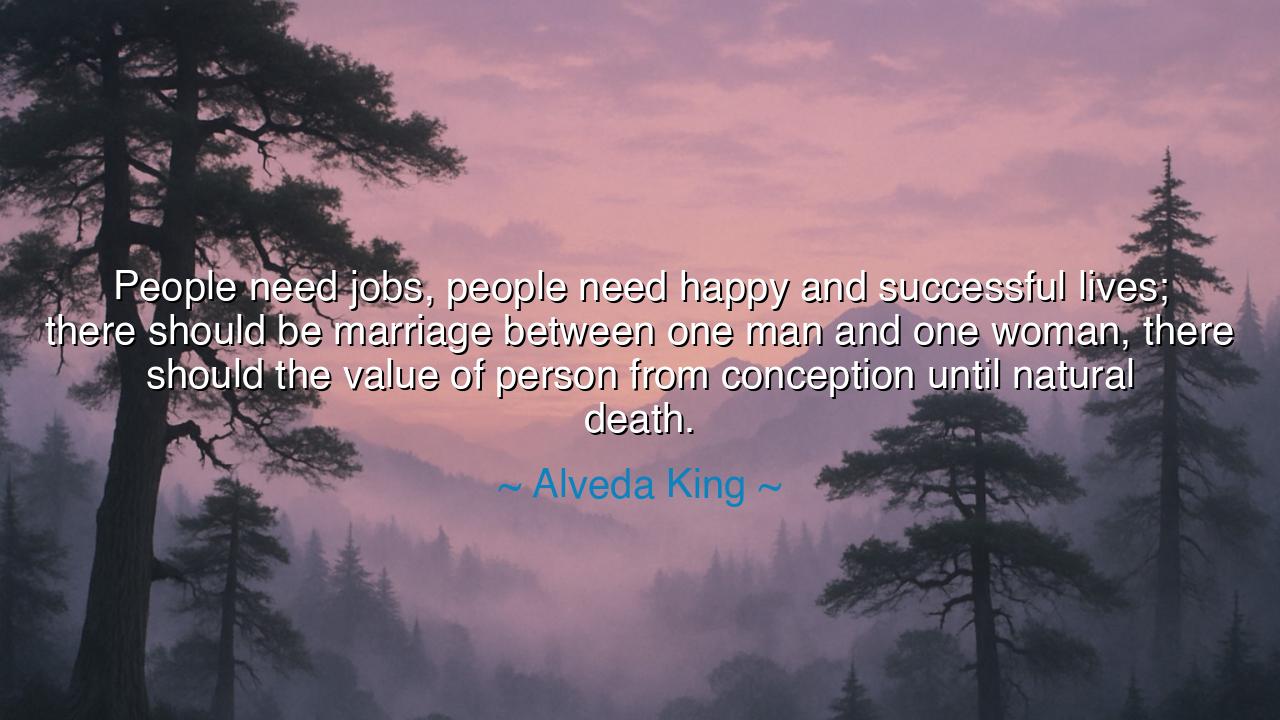
People need jobs, people need happy and successful lives; there
People need jobs, people need happy and successful lives; there should be marriage between one man and one woman, there should the value of person from conception until natural death.






When Alveda King declared, “People need jobs, people need happy and successful lives; there should be marriage between one man and one woman, there should be the value of person from conception until natural death,” she was not merely speaking as an activist or a thinker—she was speaking as a guardian of divine order, echoing the wisdom of generations that came before her. In her words is the harmony of heaven and earth, a vision of human life that upholds both dignity and duty, both the physical needs of man and the spiritual law that sustains the soul. Her message is both practical and sacred: a call to restore balance in a world that often forgets the foundations upon which civilization stands.
The meaning of her words lies in their completeness. She speaks of work, love, and life—three pillars upon which every society must stand. Without work, the body grows restless and dependent; without love and family, the heart grows cold and aimless; without reverence for life itself, the soul loses its sense of purpose. In a single sentence, Alveda King outlines the order that allows humanity to flourish. Her belief is not confined to politics or culture; it is rooted in the eternal rhythm of creation. For since the beginning of time, man has been called to labor, to love, and to protect life—the three duties that define our shared humanity.
When she says that “people need jobs,” she affirms that every human being deserves the dignity of work—the chance to contribute, to create, and to stand upon their own strength. In the ancient world, even kings were judged by how they nurtured the labor of their people. Work, rightly done, gives meaning to life; it teaches discipline, gratitude, and purpose. To deny people work is to rob them not only of sustenance but of self-respect. In this, King’s message echoes the wisdom of her grandfather’s generation, and of her uncle, Dr. Martin Luther King Jr., who proclaimed that “all labor that uplifts humanity has dignity.” The right to work is the right to live with purpose.
But Alveda’s quote moves beyond labor into the realm of love and family, proclaiming that “there should be marriage between one man and one woman.” To her, marriage is not merely a personal choice, but a sacred covenant that binds love to responsibility, passion to permanence. It is the vessel through which life continues and virtue is passed on. In the ancient traditions of many peoples, marriage was seen as the root of social harmony—a reflection of the divine union between order and creation. Without this foundation, society loses its stability, and love itself becomes fragmented, detached from the sacred duty of nurturing life. Thus, her defense of marriage is not an exclusionary act—it is an affirmation of structure, a call to preserve what anchors the generations together.
Finally, she speaks of the value of the person “from conception until natural death.” Here, Alveda King invokes the deepest truth of all: that every life, no matter how small or frail, bears the image of the Creator. In this, she aligns herself with the ancient prophets, who cried out against the shedding of innocent blood, and with the saints, who tended to the dying with tenderness and reverence. To value life at all its stages is to recognize that existence itself is sacred—that every heartbeat, from womb to grave, is a note in the great symphony of creation. In a world quick to discard the weak or inconvenient, her words stand as a moral beacon, reminding us that civilization’s greatness is measured not by its power, but by its compassion.
We can see this truth reflected in the story of Mother Teresa, who walked among the poorest of the poor in Calcutta. She offered no wealth, no political power—only the belief that every person, even the dying beggar in the street, was infinitely precious. Her work brought hope to thousands, not through ideology, but through reverence for life itself. Like Alveda King, she understood that society is healed not by policies alone, but by hearts that value every human being as a divine creation. In honoring the sacredness of life, she helped restore the sacredness of humanity.
The lesson in Alveda King’s words is both ancient and urgent: to build a just world, we must uphold the pillars of work, love, and life. We must ensure that every person has the chance to labor with dignity, to love with fidelity, and to live with value. To ignore any of these is to weaken the structure of the human spirit. The wisdom of the ancients teaches that when the order of creation is broken, chaos follows; but when men and women live according to divine balance, peace and prosperity return.
So, my child, remember these truths. Work not only for profit, but for purpose. Love not only with passion, but with commitment. And protect life not only when it is convenient, but when it is sacred and fragile. In doing so, you become part of the great restoration of harmony that Alveda King envisions—a world where every life is honored, every family is strong, and every soul finds dignity in its labor and peace in its heart. For to uphold life is to uphold God’s own image, and in that act, humanity finds its truest freedom.






AAdministratorAdministrator
Welcome, honored guests. Please leave a comment, we will respond soon